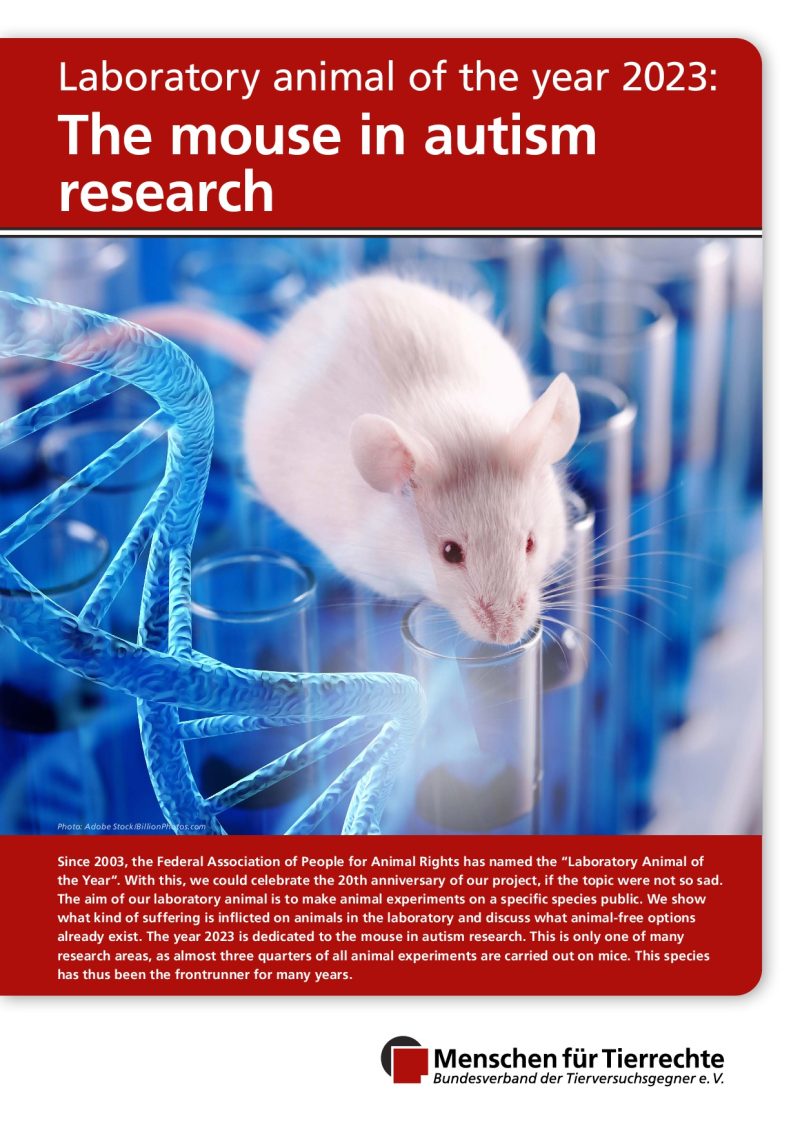People for Animal Rights Germany present this year’s nomination for the Laboratory Animal of the Year: The mouse in autism research. Despite the fact that it is scientifically disputed which phenomena belong to the spectrum of autism disorders, autism is being researched on genetically modified „humanized“ mice. And this happens although the transferability of the research results is highly questionable and the genetic manipulation is associated with great suffering for the animals. At the same time, animal-free human-specific methods, such as disease models from human cells or methods based on artificial intelligence, deliver impressive results.
The mouse is the number 1 animal used in autism research: while the number of mice approved in Germany in 2019 was 23,582, by 2022 it had risen to over 77,000 animals. Autism has no uniform disease pattern and a great deal about it is still uncertain. Although the so-called „autism spectrum disorders“ are commonly regarded as a neurodevelopmental disorder, it is still unclear whether the various manifestations are a „disorder“, a „disability“ or just a „difference“. It is known that autism is inherited in over 90 percent of cases. The disorder is therefore being researched on mice that are genetically modified specifically for this purpose.
Research results questionable
“These ‚humanized‘ mice are genetically engineered to develop ‚patient-like‘ behavior, cognition and physiological changes. The transferability of these research results is highly questionable. “Science just doesn’t know enough about the neurophysiology and comorbidities (1) of autism. The depressions, communication difficulties or bipolar disorders that often occur together with autism cannot be reliably represented with an animal model,“ criticizes Dr. Christiane Hohensee, project leader of the InVitro+Jobs information platform.
Suffering of genetically modified animals
Added on top of this is the suffering of the genetically modified animals. To silence genes, live mouse embryos are removed from the uterus of the pregnant female mouse, genetically manipulated, and then reintroduced into the body cavity. At certain developmental intervals, a number of dams are killed by cervical fracture and the fetuses are removed for brain examination. Some of the offspring may be carried to term and are included in the trial. The animals are separated by sex and subjected to behavioral tests.
Aetiology is possible without animal testing
Many questions of autism can be researched well with induced pluripotent stem cells or in vitro disease models. The results are suitable for disease diagnostics as well as for the development of drugs. For this purpose, scientists have developed brain organoids from patient cells. Thus, they were able to show how autism-associated mutations disrupt important developmental processes. Other scientists have been able to predict autism very reliably using deep learning (2).
Animal-free methods instead of „humanized“ mice
“These examples show the advantages and the great potential of non-animal, human-specific methods. In addition to disease models from human cells, methods based on artificial intelligence, such as deep learning, are already delivering impressive results. Instead of experimenting with genetically modified mice in a painful and scientifically questionable manner, these sustainable human-based methods should be specifically promoted, developed and expanded. This would be in the best interest of humans and animals,” says Hohensee.
(1) A comorbidity describes another, diagnostically definable clinical picture or syndrome that is present in addition to an underlying disease.
(2) Deep learning is a special method of information processing and a part of machine learning. Inspired by how the human brain works, it uses neural networks to produce artificial intelligence
Contact:
Project Leader InVitro+Jobs: Dr. rer. nat. Christiane Hohensee
Phone: +49 (0) 30-53026377, E-Mail: hohensee@invitrojobs.com
Press Department:
Christina Ledermann
Fon: +49 (0) 5840/2900025
Mobile: +49(0) 179/450 46 80
E-Mail: ledermann@tierrechte.de
Menschen für Tierrechte – Bundesverband der Tierversuchsgegner e.V.
Severinusstr. 52, 53909 Zülpich
Tel: 02252/830 12 10
www.invitrojobs.com
www.tierrechte.de
People for Animal Rights Germany – Federal Association Against Animal Experiments (PARG) was founded in 1982 and is an association of about 100 regional and nationwide organisations as well as individual members. PARG serves as an umbrella organisation within the animal rights movement in order to allow groups with similar aims and objectives to unite and network.
Our aims are to improve the legal situation for the animals, gain recognition of basic animal rights and prevent any cruelty to, and misuse of, animals. The long-term goal is a fundamental change in the human-animal relationship. To this end, the association is pursuing a master plan to phase out animal testing and a turnaround from animal to vegetable protein production in order to end the „farm animal“ attitude. To achieve our aims we use legal, democratic and peaceful means only.

